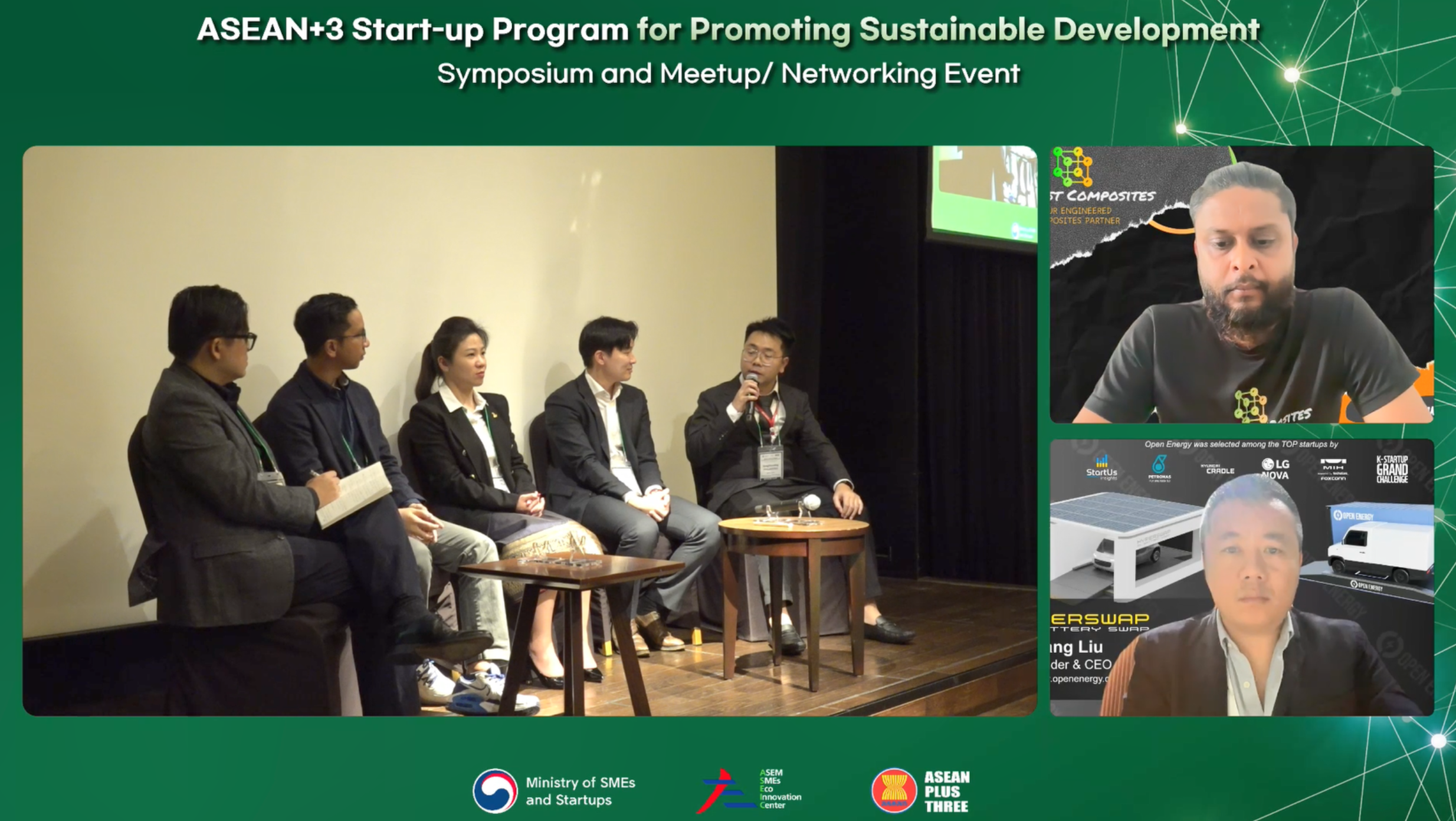[Jan16/Symposium and Meetup/Networking Event] Summary of Case Study 3 (Innovation)
- 2025.03.12
- 관리자
Case Study 3. Deep-tech Startups for INNOVATION
*Moderator: Mr. Kenneth LI, Managing Partner, MDI Ventures
Mr. Sittikorn NUALROD, CPO, Carbonwize, Thailand
Ms. Phonepasong MIXAB, CEO, Loca Company Ltd., Lao PDR
Mr. Sethu Raaj Munusamy, CEO, Midwest Composites, Malaysia (Online)
Mr. Tin Hang Liu, CEO, Open Energy, Singapore (Online)
Mr. Taeyong KIM, CEO, Rovigos, Republic of Korea
Mr. Sengthavong PHILAVONG, Developer, Wayha Sokxay Technology, Lao PDR

Panel Discussion
Q. What are the biggest challenges in technology adoption and scaling, and how can stakeholders and investors help?
A. [Carbonwise] Lack of customer understanding, complex carbon calculations, and high consulting/software costs. Expertise in carbon regulations and markets is needed.
[LOCA] High R&D and initial investment costs for EV charging networks; infrastructure expansion requires funding.
[Midwest] Companies resist paying extra for eco-friendly materials; strong government and VC support are crucial. [Open Energy] Issues with infrastructure, regulations, and funding; urgent policy and financial support needed.
[Rovigos] Hiring engineers for new technologies is costly, making market entry and profitability challenging. Financial support from VCs or governments can help scale solutions. [Wayha Sokxay] High costs in developing AI.
Q. Should startups prioritize R&D or business model development?
A. [Carbonwise] Highlighted business models and market.
[LOCA] Identify market demand first, then refine technology.
[Midwest] Balance product development with customer education and market needs.
[Open Energy] Prioritize tech but refine based on market feedback.
[Rovigos] Consider business models and market first. Develop both R&D and business model simultaneously, leveraging government support.
[Wayha Sokxay] Focus on business model first, ensuring solutions meet customer needs.
Q. What is an example policy which is beneficial to your company like an incubation program or grant?
A. [Carbonwise]There is a policy that requires startups to report their carbon emissions annually. This policy is beneficial for us, as it raises awareness among customers about this important issue.
[Loca Company Ltd] Unfortunately, in Laos, we don't have a specific policy in place yet. However, this situation provides flexibility for startups. For instance, when we need a specific license, we can discuss it with the government, and it becomes more flexible in terms of taxation.
[Rovigos] The Korean government provides $1.8 million to help build up startups, along with additional free grants. Fortunately, this support is not limited to Korean startups but is also available to foreign startups.
[Midwest Composites] In Malaysia, the government offers an acceleration program, including the "Skill Up Malaysia" program. Additionally, UNDP grants are also available.
/End/
*Moderator: Mr. Kenneth LI, Managing Partner, MDI Ventures
Mr. Sittikorn NUALROD, CPO, Carbonwize, Thailand
Ms. Phonepasong MIXAB, CEO, Loca Company Ltd., Lao PDR
Mr. Sethu Raaj Munusamy, CEO, Midwest Composites, Malaysia (Online)
Mr. Tin Hang Liu, CEO, Open Energy, Singapore (Online)
Mr. Taeyong KIM, CEO, Rovigos, Republic of Korea
Mr. Sengthavong PHILAVONG, Developer, Wayha Sokxay Technology, Lao PDR

Panel Discussion
Q. What are the biggest challenges in technology adoption and scaling, and how can stakeholders and investors help?
A. [Carbonwise] Lack of customer understanding, complex carbon calculations, and high consulting/software costs. Expertise in carbon regulations and markets is needed.
[LOCA] High R&D and initial investment costs for EV charging networks; infrastructure expansion requires funding.
[Midwest] Companies resist paying extra for eco-friendly materials; strong government and VC support are crucial. [Open Energy] Issues with infrastructure, regulations, and funding; urgent policy and financial support needed.
[Rovigos] Hiring engineers for new technologies is costly, making market entry and profitability challenging. Financial support from VCs or governments can help scale solutions. [Wayha Sokxay] High costs in developing AI.
Q. Should startups prioritize R&D or business model development?
A. [Carbonwise] Highlighted business models and market.
[LOCA] Identify market demand first, then refine technology.
[Midwest] Balance product development with customer education and market needs.
[Open Energy] Prioritize tech but refine based on market feedback.
[Rovigos] Consider business models and market first. Develop both R&D and business model simultaneously, leveraging government support.
[Wayha Sokxay] Focus on business model first, ensuring solutions meet customer needs.
Q. What is an example policy which is beneficial to your company like an incubation program or grant?
A. [Carbonwise]There is a policy that requires startups to report their carbon emissions annually. This policy is beneficial for us, as it raises awareness among customers about this important issue.
[Loca Company Ltd] Unfortunately, in Laos, we don't have a specific policy in place yet. However, this situation provides flexibility for startups. For instance, when we need a specific license, we can discuss it with the government, and it becomes more flexible in terms of taxation.
[Rovigos] The Korean government provides $1.8 million to help build up startups, along with additional free grants. Fortunately, this support is not limited to Korean startups but is also available to foreign startups.
[Midwest Composites] In Malaysia, the government offers an acceleration program, including the "Skill Up Malaysia" program. Additionally, UNDP grants are also available.
/End/
Comments
Delete Comment
You must enter a password to delete this comment.
- Password
